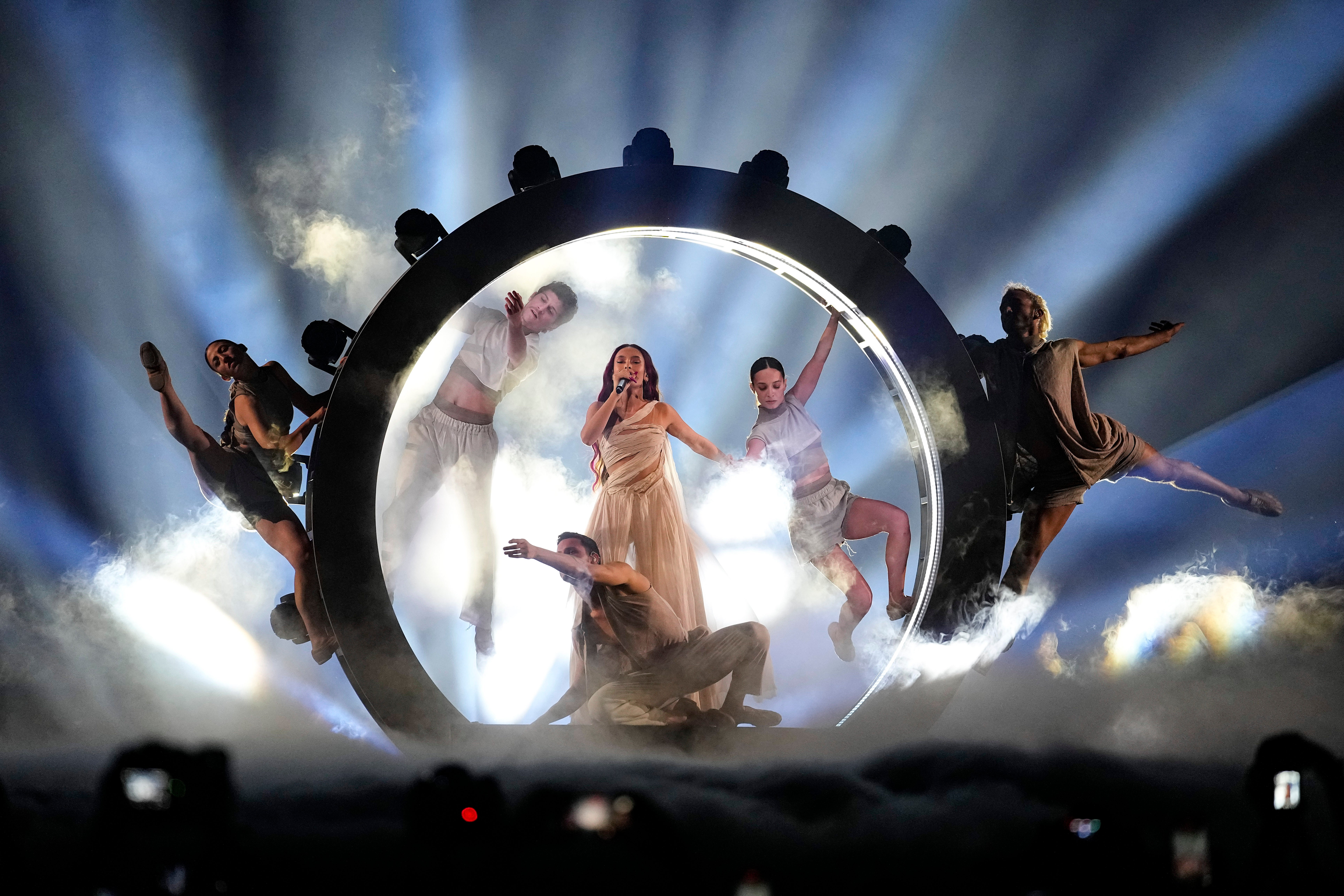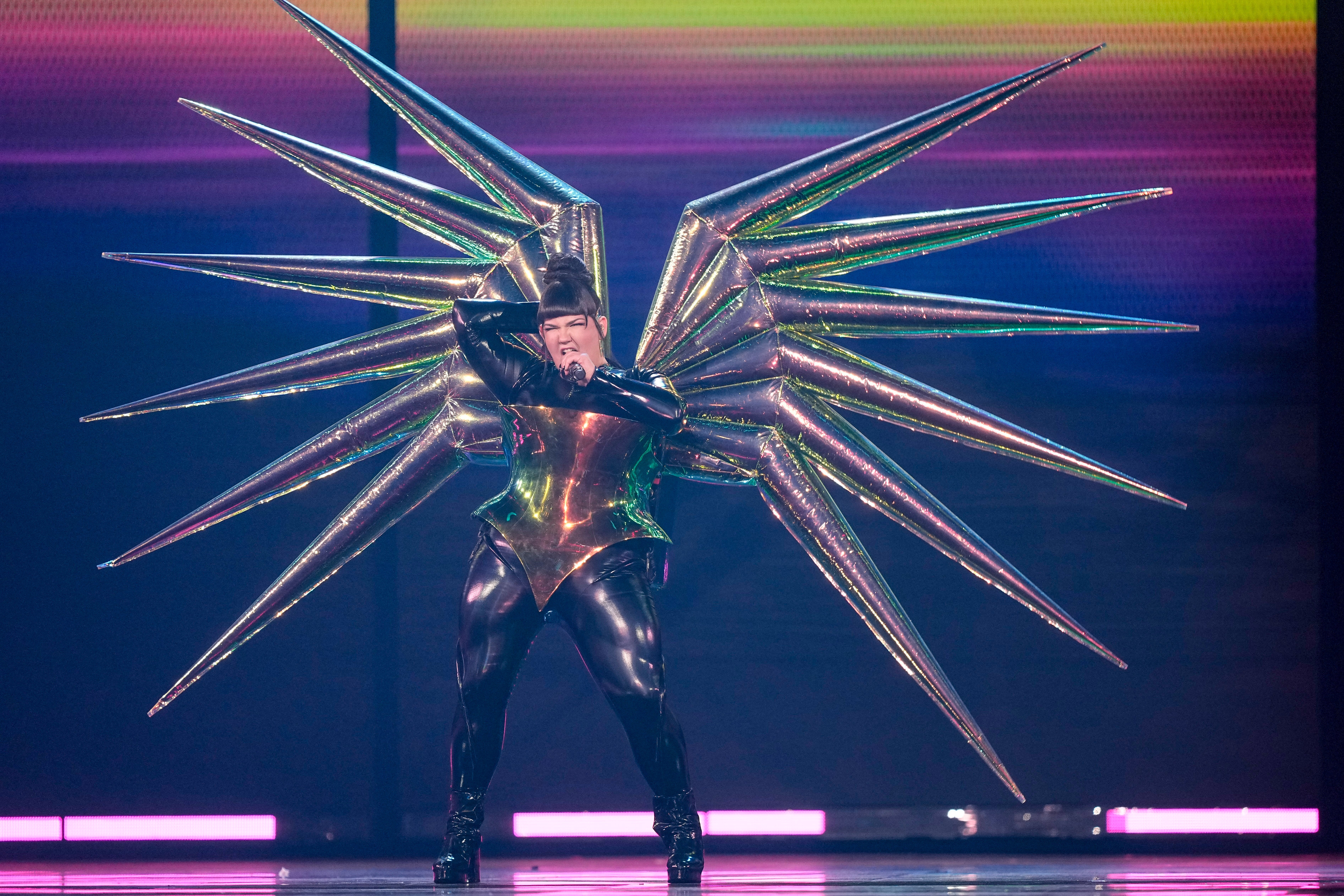Why is Israel in the Eurovision Song Contest final?
Further protests are due to take place in Malmö, Sweden, after Eden Golan qualified for the grand final on Saturday
Your support helps us to tell the story
From reproductive rights to climate change to Big Tech, The Independent is on the ground when the story is developing. Whether it's investigating the financials of Elon Musk's pro-Trump PAC or producing our latest documentary, 'The A Word', which shines a light on the American women fighting for reproductive rights, we know how important it is to parse out the facts from the messaging.
At such a critical moment in US history, we need reporters on the ground. Your donation allows us to keep sending journalists to speak to both sides of the story.
The Independent is trusted by Americans across the entire political spectrum. And unlike many other quality news outlets, we choose not to lock Americans out of our reporting and analysis with paywalls. We believe quality journalism should be available to everyone, paid for by those who can afford it.
Your support makes all the difference.Israel will compete in this year’s Eurovision Song Contest, despite calls for the country to be banned from participating due to its ongoing war on Gaza.
Eden Golan is representing Israel with the track “Hurricane”, which was reworked from original entry “October Rain” after it was alleged to include references to the 7 October attacks by Hamas, therefore breaching the European Broadcasting Union’s (EBU) rules over political songs.
The Israel-born Golan, who grew up in Russia, told ITV News this week that she could not have asked “for a better year to be representing my country”.
She has qualified to compete in the grand final tonight (Saturday 11 May), where she will be up against favourites including Switzerland’s Nemo with “The Code”, and the Netherlands’ Joost with “Europapa”.
Protests over Israel’s participation are underway in Malmö, Sweden, which is hosting this year’s contest following Swedish contestant Loreen’s win with “Tattoo” in 2023.
Non-European countries are still allowed to take part in Eurovision if they become a member of the EBU, the organiser behind the event.
This means that countries such as Israel, Azerbaijan, Georgia and Australia are allowed to compete.

The EBU has defended its decision to permit Israel to take part and rejected comparisons to Russia, which was banned from participating in 2022 due to consistent breaches of membership obligations and a violation of “public service media values”.
Speaking on Sunday Morning With Trevor Phillips, Jean Philip De Tender, the deputy director general of the European Broadcasting Union (EBU) which organises Eurovision, said it based its decision to include Kan on the competition rules in place.
“I fully agree it is a family event and the great thing about this music competition is that it’s all about values,” he said. “It’s about uniting onstage all of these young talents, these participants, and they do great. It’s about diversity and inclusion.
“But there are competition rules and you need to follow the competition rules and take decisions based on these competition rules.
“If you were to exclude Kan outside of these competition rules, that would have been a political decision, as such, which we cannot take.”

Israel has won Eurovision four times, first in 1978 with Izhar Cohen and the Alphabeta’s “A-Ba-Ni-Bi”, then again the following year with Milk and Honey singing “Hallelujah”.
Its next triumph was in 1998, in a historic moment where Dana International became the first transgender artist to win the Eurovision Song Contest with her song “Diva”, turning her into a global icon.
Israel’s most recent win was with Netta, who performed the eccentric pop song “Toy”, in 2018.
In April, the collective Queers for Palestine circulated an open letter signed by actors Indya Moore, Brigette Lundy-Paine and Maxine Peake, calling for UK entrant Olly Alexander to withdraw from Eurovision 2024 in protest against Israel’s participation.
Artists and music organisations in Finland, Sweden, Ireland and Iceland have also protested against their countries’ delegates taking part.
Meanwhile, protests have taken place in Sweden as well as outside the BBC’s Broadcasting House in London, and in Barcelona, Amsterdam and Reykjavik.
Alexander and other Eurovision artists shared a statement in response to the Queers for Palestine letter, beginning by acknowledging the “privilege of taking part in Eurovision”.
“In light of the current situation in the Occupied Palestinian Territories, and particularly in Gaza, and in Israel, we do not feel comfortable being silent.
“It is important to us to stand in solidarity with the oppressed and communicate our heartfelt wish for peace, an immediate lasting ceasefire, and the safe return of all hostages. We stand united against all forms of hate, including antisemitism and islamophobia.”
His team continued with a message of optimism and a belief in the “power of music”, adding: “We firmly believe in the unifying power of music, enabling people to transcend differences and foster meaningful conversations and connections.
“We feel it is our duty to create and uphold this space, with a strong hope that it will inspire greater compassion and empathy.”

The decision has led to online backlash with Queers For Palestine who organised the original letter, calling the statement “condescending” and accusing Alexander of a “lack of concern, if not contempt for the Palestinian people of Gaza”.
Alexander’s response was branded “disappointing” by critics, with many on social media pointing to his history of activism and accusing him of hypocrisy.
However, some Eurovision participants have continued to be vocal in their calls for a ceasefire in Gaza, pushing back against the EBU’s requests to keep the contest a “non-political” event.
Swedish pop singer Eric Saade wore the Middle Eastern scarf around his wrist during a guest performance at the first semi-final of the contest in Malmö, Sweden, on Tuesday evening (7 May). The scarf has continually been used as a symbol of pro-Palestine support throughout Israel’s ongoing war in Gaza.
Saade’s decision to wear the scarf was condemned by the EBU, who announced ahead of the competition that they reserve the right to remove any Palestinian flags and pro-Palestine symbols at the show.
Ireland’s Bambie Thug told a press conference in Malmö that they were forced to change their body paint in Ogham script (an early Medieval alphabet), which translated to “ceasefire” and “freedom”, a nod to the situation in Gaza and amid Israel’s inclusion in the competition.

“It was very important for me because I’m pro justice and pro peace,” Bambie said. “Unfortunately, I had to change those messages today to ‘crown the witch’ only (which was an) order from the EBU.”
A spokeswoman for the European Broadcasting Union (EBU) said: “The writing seen on Bambie Thug’s body during dress rehearsals contravened contest rules that are designed to protect the non-political nature of the event.
“After discussions with the Irish delegation, they agreed to change the text for the live show.”
What has the EBU said about the protests?
In April, the EBU issued its own statement condemning “abuse or harassment” directed at participants.
“The EBU recognises the strong emotions stirred by this year’s Eurovision Song Contest and the intense debate sparked by the inclusion of an Israeli entry,” the statement said.
“We would like to stress that any decisions regarding participation are the responsibility of the EBU’s governing bodies, not the individual artists. We are firmly against any form of abuse or harassment directed at participants, online or offline, and are committed to fostering a safe, respectful, and inclusive environment.
“We advocate for constructive dialogue and support for the artists, underlining the Contest’s mission to be United by Music.”
